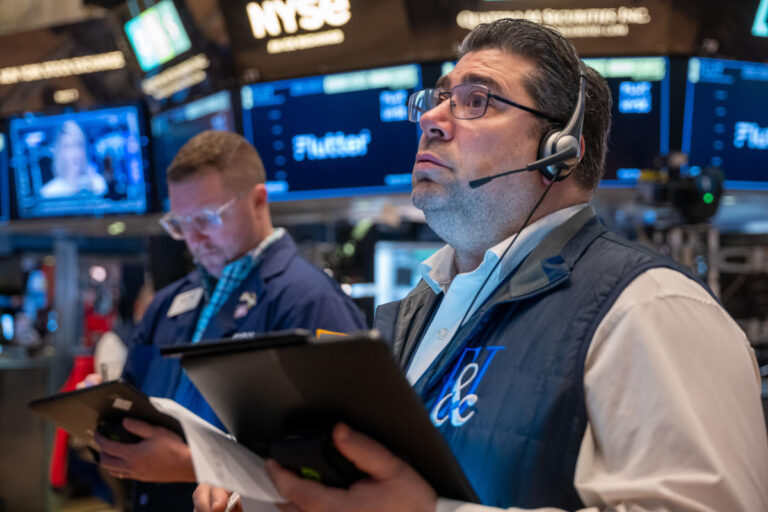US stocks rose on Thursday as Big Tech stocks led a rebound from a sell-off fueled by Wednesday’s surprise uptick in consumer prices.
The tech-heavy Nasdaq Composite (^IXIC) led the way, gaining roughly 1.7%. The S&P 500 (^GSPC) rose about 0.7%, while the Dow Jones Industrial Average (^DJI) had a more modest day, closing just slightly below the flatline.
Meanwhile, the 10-year Treasury yield (^TNX) traded around 4.56%, steadying after surging to touch its highest level since November on Wednesday.
Members of the “Magnificent 7” tech stocks helped lead the rally: Apple (AAPL) and Nvidia (NVDA) were both up more than 4%, while Amazon (AMZN) gained more than 1.5% to hit its first record high since 2021.
The inflation front produced a slightly better picture for investors on Thursday: Producer Price Index in March rose 0.2% from the previous month, a lower rate of growth than economists had forecast. Year-over-year growth of 2.1% was also below estimates. However, that annual growth represented the fastest jump in producer prices in nearly a year.
Stocks pulled back and bond yields soared after a hotter-than-expected March CPI report prompted investors to reassess expectations for Federal Reserve policy. The market is now pricing in just two rate cuts in 2024, to come later in the year than foreseen.
Read more: What the Fed rate decision means for bank accounts, CDs, loans, and credit cards.
Against that backdrop, hopes are that first-quarter corporate results can provide momentum to stocks, given limited signs that high borrowing costs are slowing earnings. As reports trickle in, investors are bracing for quarterly updates from some of America’s biggest banks, including JPMorgan (JPM), to usher in the season in earnest on Friday.
LIVE COVERAGE IS OVER13 updates
-
Magnificent 7 lead the market rally
Thursday’s market action was reminiscent of the 2023 stock market rally.
Technology (XLK) was the clear outperformer on Thursday, rising more than 2%. Specifically, Big Tech outperformed too.
Roundhill’s Magnificent Seven ETF (MAGS) rose more than 2% on the day, led by more than 4% gains in both Apple (AAPL) and Nvidia (NVDA). The other five members of the Magnificent Seven — Alphabet (GOOGL, GOOG), Microsoft (MSFT), Amazon (AMZN), Meta (META), and Tesla (TSLA) — were all up on the day too.
In sum, analysis from Yahoo Finance’s Jared Blikre shows the seven tech stocks added more than $300 billion in market cap on Thursday.
-
Mortgage rates hit nearly 7.4%
Mortgage rates are on the rise once again as the prospect of higher-for-longer interest rates proliferates through markets.
Yahoo Finance’s Gabriela-Cruz Martinez reports:
Homebuyers are feeling whiplashed by surging mortgage rates, and the outlook just turned grim.
The average rate on the 30-year mortgage increased to 7.37% on Thursday, a steep climb from 7.11% at the beginning of the week, according to Mortgage News Daily. The quarter-point increase comes as rattled investors respond to a hotter-than-expected inflation reading.
At the same time, a separate measure tracking weekly average rates rose to 6.88%, up from 6.82% the week prior, Freddie Mac found.
Elevated rates have left would-be buyers in a pinch, causing both repeat and first-time buyers to step away from any purchase plans. For many, any shift in rates means losing more of their purchasing power.
With inflation still running hot this past month, the results haven’t been favorable for mortgage borrowers, housing industry experts said.
“March inflation figures were very bad, which also means bad news for interest rates,” said Lawrence Yun, chief economist at the National Association of Realtors.
-
Apple stock is having its best day in 11 months
Apple (AAPL) stock was up nearly 4% in afternoon trade, pacing for its best one-day gain in nearly a year.
The move came after Bloomberg reported the tech giant is preparing to enhance its Mac computers with a new group of in-house processors focused on artificial intelligence. Bloomberg wrote this would be an effort for Apple to “boost sluggish computer sales.”
Apple’s rise on Thursday comes after a tough run for the stock, which recently hit its lowest levels of 2024 amid concerns of overall slowing demand for its suite of tech products.
-
Deutsche Bank, Bank of America now see Fed cutting rates in December
Investors hoping for interest rate cuts may have to wait for an early holiday season present from the Federal Reserve.
After further signs that inflation’s decline has slowed while economic growth remains resilient, the economics teams at Bank of America and Deutsche Bank both pushed back their projections for Fed interest rate cuts this year.
Both economics teams, which had previously seen easing starting in the early summer, now believe the Fed will cut for the first time in December, meaning just one total cut for 2024.
“We no longer think policymakers will gain the confidence they need to start cutting in June,” Bank of America US economist Michael Gapen wrote in a research note on Thursday. “We expect inflation to remain relatively firm in the near term. We are forecasting 0.25% m/m for core PCE in March and April. This will make a cut as early as June or September unlikely absent clear signs of labor market deterioration.”
Deutsche Bank chief US economist Matthew Luzzetti wrote in a new research note that recent developments, including hotter-than-expected inflation prints, solid labor market data, and easing financial conditions, have “clearly diminished the case for commencing rate cuts.”
Luzzetti wrote that more challenging year-over-year comparisons for inflation readings later in the year, as well as the prospect of cutting rates near the election only based on more positive inflation data, could limit the Fed’s willingness to cut prior to December.
Luzzetti added that risks to this stance are “two-sided.”
“Further disappointing inflation data or an election outcome that delivers fiscal stimulus and / or policies that could lift inflation (e.g., trade or immigration policies) would argue for no rate cuts this year and into 2025,” Luzzetti wrote. “Conversely, higher-for-longer raises the risks of financial stability events or a more aggressive tightening of financial conditions that could trigger a sharper slowdown in the economy that eventually necessitates more significant policy easing.”
-
Latest data shows investors should be ready for ‘inflation volatility’
A hotter-than-expected consumer prices reading sent markets into a tizzy on Wednesday as investors pushed back expectations for interest rate cuts amid fears inflation’s decline may be slowing.
On Thursday, wholesale price increases told a slightly different story. The latest Producer Price Index (PPI) showed core prices, which exclude the volatile food and energy categories, increased 0.2% month over month in March, down from a 0.3% increase seen in February.
Notably, the month-over-month PPI number was lower than the 0.4% increase seen in Wednesday’s Consumer Price Index (CPI) report.
“After another sizzling CPI report, producer prices offer some relief for Fed officials who may view the recent price reports as too hot to consider rate cuts in the immediate future,” Oxford Economics US economist Matthew Martin wrote in a note to clients on Wednesday.
To Charles Schwab senior investment strategist Kevin Gordon, the conflicting data from the last two days provides a clear takeaway for investors.
“Volatile inflation is the reality for the next several years,” Gordon told Yahoo Finance. “One month you go back into, you know, core goods inflation, the next month, meaning March, you go back into core goods deflation, and everybody’s pointing at these different drivers of what was sending inflation higher each month.”
He added, “In terms of positioning for that, it tends to, all else equal, be more supportive to the value-oriented parts of the market.”
-
Trending tickers Thursday
Rent the Runway (RENT)
Shares of the clothes-rental platform soared during Thursday’s trading session after the company shared an upbeat outlook for the year ahead. Rent the Runway stated that is expects 2024 to be a “milestone” year for the company’s financials.
The clothing rental retailer anticipates break-even free cash flow this year.
Rivian Automotive (RIVN)
Shares of the EV startup were trading below $10 each for the first time after a report that rival Ford (F) has lowered the price of its F-150 Lightning in an effort to boost electric vehicle sales.
CarMax (KMX)
CarMax stock fell as much as 12% after the used automotive retailer posted fourth quarter results that missed analyst estimates on both the top and bottom lines.
The company also pushed back its goal to sell 2 million units annually “to between fiscal year 2026 and fiscal year 2030 due to uncertainty in the timing of market recovery.”
-
Amazon CEO Andy Jassy says the benefits of AI ‘will astound us all’
Yahoo Finance’s Dan Howley reports:
Amazon (AMZN) CEO Andy Jassy is finally going all in on generative AI. In his annual letter to shareholders on Thursday, the Amazon chief said the technology is the company’s next major product opportunity, up there with Marketplace, Prime, and Amazon Web Services (AWS).
Jassy also laid out why Amazon is uniquely positioned to thrive in the age of generative AI, explaining how the company has all of the pieces in place to be the go-to tech firm for both enterprise customers’ and consumers’ generative AI needs.
Amazon shares were on track for a record close on Thursday. The stock surpassed its highest close of $186.57, registered in July 2021.
Amazon shares are up 23% year to date.
Read more here.
-
Nvidia stock up 2%, helps maintain Nasdaq in green territory
Nvidia (NVDA) stock gained more than 2% on Thursday. Shares of the AI chipmaker helped maintain the tech-heavy Nasdaq Composite’s (^IXIC) standing in green territory while the other major averages wavered.
Nvidia shares rose after analysts at Raymond James raised their price target on the stock to $1,100 from $850. The firm maintained a Strong Buy rating on the AI darling.
Other chip-related names like Broadcom (AVGO) and Super Micro Computer (SMCI) also gained during Thursday’s session.
The major averages were mixed on Thursday. The Nasdaq Composite was up 0.4% while the Dow Jones Industrial Average (^DJI) dipped as much as 0.5%. The S&P 500 (^GSPC) traded just below the flatline.
-
Oil retreats despite concerns of escalating tensions in Middle East
Oil fell on Thursday despite worries of escalating tensions in the Middle East. West Texas Intermediate (CL=F) futures retreated almost 1% to trade below $86 per per barrel while Brent (BZ=F), the International benchmark price, hovered below $90 per barrel.
On Wednesday crude spiked amid a report that the US and its allies believe an attack on Israeli targets by Iran or its proxies is imminent.
“Near term, look for the nervous trade to continue as all eyes will be on Iran’s intentions of escalating Geopolitical events and what Israel’s retaliation would possibly be,” Dennis Kissler, senior vice president at BOK Financial wrote in a note to clients on Thursday.
WTI is up 18% year to date, while Brent is up 17% during the same period.
-
Fed’s Williams still expects rate cuts ‘starting this year’ despite ‘bumps along the way’
Jennifer Schonberger reports:
New York Fed president John Williams offered some reassurances to investors a day after another hot inflation reading spooked markets, saying it will make sense to cut rates gradually “starting this year” if the economy proceeds as expected.
“I expect inflation to continue its gradual return to 2%, although there will likely be bumps along the way, as we’ve seen in some recent inflation readings,” he said in a new speech delivered Thursday morning.
He expects the Personal Consumption Expenditures index, which is the Fed’s preferred inflation gauge, to be 2.25 to 2.50% this year “before moving closer to 2% next year.” The central bank’s goal is to bring inflation back down to 2%.
Read more here.
-
Stocks tick higher following wholesale inflation data
Stocks opened slightly higher on Thursday, reversing earlier pre-market losses after a cooler-than-expected reading on producer prices helped calm concerns of reaccelerating inflation.
The Dow Jones Industrial Average (^DJI) traded near the flatline while the S&P 500 (^GSPC) gained 0.2% coming off a rout that saw the gauges drop about 1% in the prior session. The tech-heavy Nasdaq Composite (^IXIC) gained 0.5%.
The Producer Price Index for last month rose 0.2% from the previous month, a lower rate of growth than economists had forecast.
New York Fed president John Williams offered some reassurances to investors after March’s Consumer Price index spooked markets in the prior session, saying it will make sense to cut rates gradually “starting this year” if the economy proceeds as expected.
“I expect inflation to continue its gradual return to 2%, although there will likely be bumps along the way, as we’ve seen in some recent inflation readings,” he said in a speech on Thursday morning.
-
Amazon shareholder letter read-through to Nvidia
The last thing Nvidia (NVDA) bulls watching their favorite stock enter correction territory this week want to see is Amazon (AMZN) CEO Andy Jassy’s annual shareholder letter that dropped this morning.
I found Jassy’s comments on Amazon building its own AI chips very fascinating. Emphasis mine:
“To date, virtually all the leading foundation models have been trained on Nvidia chips, and we continue to offer the broadest collection of Nvidia instances of any provider. That said, supply has been scarce and cost remains an issue as customers scale their models and applications. Customers have asked us to push the envelope on price-performance for AI chips, just as we have with Graviton for generalized CPU chips. As a result, we’ve built custom AI training chips (named Trainium) and inference chips (named Inferentia). In 2023, we announced second versions of our Trainium and Inferentia chips, which are both meaningfully more price-performant than their first versions and other alternatives. This past fall, leading foundation model-maker, Anthropic, announced it would use Trainium and Inferentia to build, train, and deploy its future foundation models. We already have several customers using our AI chips, including Anthropic, Airbnb, Hugging Face, Qualtrics, Ricoh, and Snap.
Jassy’s super-long read can be found here.
-
The day after the CPI sell-off
Yesterday was one of those shock moments in markets.
We have all lived through worse sessions for stocks and seen more eye-opening economic reports, so it wasn’t shocking in that context. It was just that investors were caught off guard by the inflationary CPI report, and they sold stocks because everyone else was selling and saying to sell.
Some calm has returned to markets this morning, but futures are still under pressure and nervousness is in the air ahead of the PPI report.
A new survey of US investors out of JP Morgan also isn’t bolstering sentiment on the Street. You can see below that investor appetite to own stocks has fallen sharply as rate cut hopes have been dialed back.
Less of an appetite to own stocks here. (JP Morgan)




